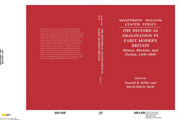Book contents
- Frontmatter
- Contents
- Preface
- WOODROW WILSON CENTER SERIES
- 1 Introduction
- 2 Precept, example, and truth: Degory Wheare and the ars historica
- 3 Truth, lies, and fiction in sixteenth-century Protestant historiography
- 4 Thomas More and the English Renaissance: History and fiction in Utopia
- 5 Little Crosby and the horizons of early modern historical culture
- 6 Murder in Faversham: Holinshed's impertinent history
- 7 Foul, his wife, the mayor, and Foul's mare: The power of anecdote in Tudor historiography
- 8 Experience, truth, and natural history in early English gardening books
- 9 Thomas Hobbes's Machiavellian moments
- 10 The background of Hobbes's Behemoth
- 11 Leviathan, mythic history, and national historiography
- 12 Protesting fiction, constructing history
- 13 Adam Smith and the history of private life: Social and sentimental narratives in eighteenth-century historiography
- 14 Contemplative heroes and Gibbon's historical imagination
- Contributors
- Index
- Titles in the series
5 - Little Crosby and the horizons of early modern historical culture
Published online by Cambridge University Press: 04 August 2010
- Frontmatter
- Contents
- Preface
- WOODROW WILSON CENTER SERIES
- 1 Introduction
- 2 Precept, example, and truth: Degory Wheare and the ars historica
- 3 Truth, lies, and fiction in sixteenth-century Protestant historiography
- 4 Thomas More and the English Renaissance: History and fiction in Utopia
- 5 Little Crosby and the horizons of early modern historical culture
- 6 Murder in Faversham: Holinshed's impertinent history
- 7 Foul, his wife, the mayor, and Foul's mare: The power of anecdote in Tudor historiography
- 8 Experience, truth, and natural history in early English gardening books
- 9 Thomas Hobbes's Machiavellian moments
- 10 The background of Hobbes's Behemoth
- 11 Leviathan, mythic history, and national historiography
- 12 Protesting fiction, constructing history
- 13 Adam Smith and the history of private life: Social and sentimental narratives in eighteenth-century historiography
- 14 Contemplative heroes and Gibbon's historical imagination
- Contributors
- Index
- Titles in the series
Summary
The importance of antiquarianism in the creation of modern attitudes to the past, and of modern historical method, has long been acknowledged. Building on the work of classicists and Europeanists such as Arnaldo Momigliano, students of English historiography in particular have pointed out the ways in which confrontation with the archaeological and documentary remains of ancient and modern times reoriented history away from a recitation of events toward an appreciation of cultural change, institutional development, and social evolution. Works by Thomas Kendrick, David C. Douglas, Stuart Piggott, F. J. Levy, J. G. A. Pocock, Arthur B. Ferguson, Joseph M. Levine, and Stan A. E. Mendyk demonstrate how the antiquarian methods developed by John Leland, William Camden, Henry Spelman, and others, growing out of the powerful tradition of Renaissance scholarship that included Flavio Biondo, Poggio Bracciolini, Lorenzo Valla, Guillaume Bude, and Joseph Scaliger, provided the foundations for the great achievements of eighteenth- and nineteenth-century historians like Edward Gibbon, while gradually diminishing belief in legendary personalities such as Albion, Samothes, and Brutus the Trojan.
My task is not to dispute this “high” account of the origins of history. Rather, I wish to broaden it beyond its usual concerns – matters of evidence, literary craftsmanship, and philological technique – into a consideration of the social and cultural grounds in the early modern period that gave rise to the very methodological advances that are usually accredited wholly to intellectual stimuli such as “humanism.” The present essay touches on traditional historiographical issues but plumbs more deeply for some of the defining characteristics of early modern English historical culture between the early sixteenth and early eighteenth centuries to speculate on that culture's relation to the profoundly historical popular mindset of the modern West.
- Type
- Chapter
- Information
- The Historical Imagination in Early Modern BritainHistory, Rhetoric, and Fiction, 1500–1800, pp. 93 - 132Publisher: Cambridge University PressPrint publication year: 1997
- 6
- Cited by

